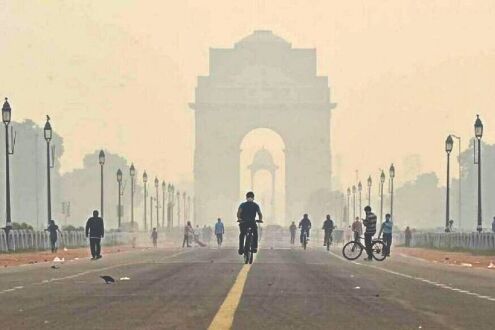'Air expected to turn severe by Diwali night'

New Delhi: Delhi's air quality worsened to enter the "very poor" category on Tuesday with monitoring agencies predicting further deterioration owing to an expected increase in farm fires coupled with firecrackers being burst on Diwali night.
The Centre's CPCB said that the air quality index for the Capital stood at 303 as of 4 pm on Tuesday, adding that it could deteriorate into the "severe" zone from November 4 onwards, with farm fires' share in Delhi's air set to increase to up to 40 per cent by then.
Under the zero firecracker emission scenario, Delhi's PM2.5 concentration is predicted to be in the upper end of the 'very poor' category from November 4 to November 6.
"However, even if we consider 50 per cent of firecracker-related emissions of 2019, the AQI is predicted to degrade to the 'severe' category from November 4 night and will remain so till November 5," SAFAR said.
The PM2.5 concentration in the national capital can surpass 300 micrograms per cubic metre on November 5. The safe limit is 60 micrograms per cubic metre.
The contribution of farm fires in Delhi's air pollution has remained low this season so far due to the record-breaking rainfall in October and "unfavourable" wind direction but is set to rise.
However, it is likely to go up to 40 per cent by November 5 as the wind direction is expected to change northwesterly after Diwali, said Gufran Beig, the founder project director of SAFAR. Northwesterly winds carry smoke from farm fires in Punjab and Haryana towards the national capital.
Farm fires accounted for six per cent of the PM2.5 pollution in the national capital on Tuesday. The contribution will remain marginal (less than 10 per cent) until November 3 despite a higher fire count due to unfavourable wind direction, SAFAR said.
"Stubble fire share in Delhi's PM2.5 is predicted to be 20 per cent to 40 per cent during November 4-6," SAFAR said, adding the peak could be recorded on November 5 if the fire counts are assumed to be 4,000 as expected.
Last year, the share of stubble burning in Delhi's pollution had peaked at 42 per cent on November 5. In 2019, crop residue burning accounted for 44 per cent of Delhi's PM2.5 pollution on November 1.
The air quality in the national capital entered the "very poor" category for the first time this season on Tuesday. Neighbouring cities of Faridabad (306), Ghaziabad (334) and Noida (303) also recorded very poor air quality.
Meanwhile, the mercury here settled at a maximum of 27 degrees Celsius on Tuesday, with the minimum temperature settling at 15.6 degrees Celsius, a few notches higher than previous days.



